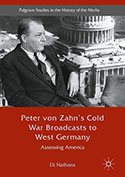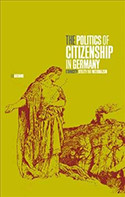History Personnel
Teaching - Fall/Winter 2025-26
HIST 1403G - Twentieth-Century Europe
HIST 2147A - Nazi Germany
HIST 3428G - Modern Germany, 1871 to the Present
HIST 9417A - Europe Since World War Two
Supervision
Master's & Doctoral Level supervisory privileges
Eli Nathans
- Associate Professor

PhD, Johns Hopkins University, 2001
Telephone: 519-661-2111 ext. 84977
Email: enathans@uwo.ca
Office: Lawson Hall 2217
Office Hours: Winter Term 2025 - Wednesdays 1:30 pm - 3:30 pm
Research Interests
Professor Nathans has written an examination of the conduct of a leading official of the Nazi administration of justice who was tried after the war, a history of German citizenship policies, and an analysis of postwar West German debates about the weaknesses and strengths, possibilities and deficiencies, of republican forms of state and society, via an examination of the work of a prominent West German journalist who analyzed the United States in radio and television broadcasts. Nathans’ current research project focuses on the history of one of the causes of the rise of an authoritarian movement in the United States, the decades-long experience of economic distress that has led large numbers of Americans to reject the republican political order.
Teaching Philosophy
Historical study offers the opportunity to move beyond the limits of one's own time and place, to analyze foreign societies and individual lives that may differ greatly from our own. It enables students to examine patterns that are larger than an individual life or even several lives. It explores the ways in which contemporary societies are the product of past experiences and choices, or perhaps break with their pasts.
My classes explore all these aspects of the past, as well as a range of other more focused questions. In my classes on modern Europe students answer questions such as: Why did anti-democratic ideologies like Nazism and Communism prove attractive to some? What forms of hierarchy have existed in modern societies? How have these hierarchies influenced life chances and choices? Why, in the course of the past several decades, have parliamentary forms of government in Europe come under attack, especially from the political right?
I teach the Department’s first year twentieth century European history survey, upper year undergraduate courses on German history and the Holocaust, and a graduate course on post-1945 Europe. I also teach two third year undergraduate seminars on classic works of Western culture. In the first course in this sequence students read and discuss Homer’s Odyssey and selections from Aristotle’s Nichomachean Ethics, Genesis, and St. Augustine’s Confessions. The second course in the sequence focuses on a range of Enlightenment and post-Enlightenment thinkers, from Montesquieu, Rousseau, Wollstonecraft, and Burke to Hegel, Tocqueville, Frederick Douglas, and John Stuart Mill.
I assign a range of original sources, including memoirs, private letters, philosophical and religious works, and government documents. This diversity of sources offers many different perspectives and speaks to many different questions. I seek to develop students' ability to read critically and carefully, and to express themselves clearly and succinctly in discussions and in essays.
I welcome inquiries from students pursuing the M.A. in modern continental European, and especially modern German, history. My foreign languages are French and German, and I feel most competent to serve as a supervisor where research in primary and secondary sources would be conducted largely in either or both of those languages. The principal focus of my own work has been on political, intellectual, and cultural history.
Major Research Projects
My book on Peter von Zahn has three subjects. The first is the journalist Peter von Zahn, who in the 1950s captivated West German audiences with his pioneering radio broadcasts and television documentaries about the United States. Before 1945 Zahn shared the militant and elitist ethos common among educated German young men, but the experience of the war – he spent the entirety of it in the German army – and the realities of postwar Germany led to a reorientation. Zahn became a cultural pillar of the Federal Republic. I seek to characterize and explain this change in the individual. The second subject is the transformation of West Germany, from a society riven by domestic conflicts and still in many respects authoritarian, to a stable republic integrated into West European and Atlantic alliances. Although Zahn’s American broadcasts explored the United States, often the issues on which they focused were those that divided West Germans. Zahn’s broadcasts were one important voice in West German debates that accompanied and in some measure helped bring about the postwar transformation of West Germany. The third subject is the United States, as seen by Zahn. Zahn wanted to know whether the United States would prove a strong and dependable Cold War ally. With this question as his starting point he conducted a probing and sustained examination of the workings of the federal government and of American society. I examine his arguments and his conclusions. They remain relevant today.
Books & Monographs:
 Peter von Zahn's Cold War Broadcasts to West Germany. Assessing America (Palgrave Macmillan, Studies in the History of the Media: 2017).
Peter von Zahn's Cold War Broadcasts to West Germany. Assessing America (Palgrave Macmillan, Studies in the History of the Media: 2017).
Reviewed in:
Historische Zeitschrift 308:2 (2019): 568-70.
H-Soz-Kult, 12 March 2019.
Journal of American History 105:3 (2018): 749-750.
Zeitschrift für Geschichtswissenschaft 67:9 (2019): 783-5.

The Politics of Citizenship in Germany: Ethnicity, Utility and Nationalism (Berg Publishers, 2004).
Reviewed in:
Canadian Journal of History 41 (2006): 368-70.
Central European History 38 (2005): 480-2.
The English Historical Review 498 (2007): 1098.
German Society and Politics 22 (2004): 65-9.
German Studies Review 29 (2006): 436-7.
H-German (May 2005).
Historische Zeitschrift 280 (2005): 756-7.
International History Review 28 (2006): 909-11.
Journal of Contemporary Central and Eastern Europe 13 (2005): 103-5.
- L. Nuzzo, “Cittadinanza: un percorso di lettura” [Citizenship: a Guide to the Literature], in Rg [Rechtsgeschichte, or Legal History] 8 (2006): 129-47.
- Annemarie Sammartino, “After Brubaker: Citizenship in Modern Germany, 1848 to Today, ”German History 27 (2009): 583-99.
Franz Schlegelberger, Volume 3 of Der Unrechts-Staat, translated by Günter Frankenberg (Nomos Verlag, 1990).
Reviewed in:
- American Journal of Comparative Law 39 (1991): 459-62.
- Kritische Justiz 25 (1992): 120-5.
- Neue Justiz 6 (1991): 265.
- Staatsanzeiger Hessen 9 (1991): 657.
- Tijdschrift voor Privaatrecht (1991): 1012-4.
- Hans Wrobel, "Schlegelberger und seine Biographen: Kritische Anmerkungen zu zwei Sichtweisen einer Person," Ius Commune: Zeitschrift für Europäische Rechtsgeschichte 20 (1993): 273-89.
- T. Harrison, "Political Police and Lawyers in Hitler's Germany," German History 10 (1992): 226-37.
Articles:
- “Peter Von Zahn über Rassismus in den USA,” (Peter Von Zahn on Racism in the United States) in Aus Politik und Zeitgeschichte 1-2 (2009): 20-26. [read article]
- "Legal Order as Motive and Mask: Franz Schlegelberger and the National Socialist Administration of Justice," Law and History 18 (June 2000): 281-304.
Book Reviews:
Professor Nathans has published book reviews in Central European History, Histoire sociale/Social History, The University of Toronto Quarterly, The American Historical Review, Rg, Nations and Nationalism, H-German, European Historical Quarterly, Punishment and Society, The American Journal of Legal History, and Mittelweg 36.
Awards and Distinctions:
Jacob Javits Fellowship
Rhodes Scholarship

